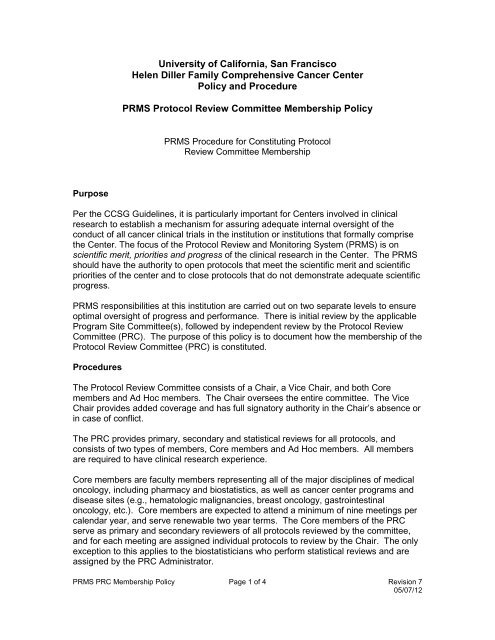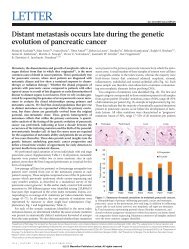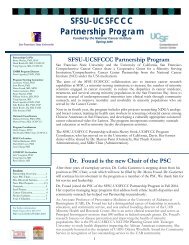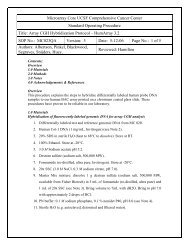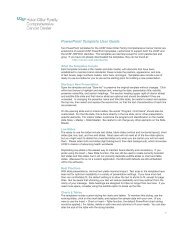Protocol Review Committee Membership Policy - UCSF Helen Diller ...
Protocol Review Committee Membership Policy - UCSF Helen Diller ...
Protocol Review Committee Membership Policy - UCSF Helen Diller ...
You also want an ePaper? Increase the reach of your titles
YUMPU automatically turns print PDFs into web optimized ePapers that Google loves.
Purpose<br />
University of California, San Francisco<br />
<strong>Helen</strong> <strong>Diller</strong> Family Comprehensive Cancer Center<br />
<strong>Policy</strong> and Procedure<br />
PRMS <strong>Protocol</strong> <strong>Review</strong> <strong>Committee</strong> <strong>Membership</strong> <strong>Policy</strong><br />
PRMS Procedure for Constituting <strong>Protocol</strong><br />
<strong>Review</strong> <strong>Committee</strong> <strong>Membership</strong><br />
Per the CCSG Guidelines, it is particularly important for Centers involved in clinical<br />
research to establish a mechanism for assuring adequate internal oversight of the<br />
conduct of all cancer clinical trials in the institution or institutions that formally comprise<br />
the Center. The focus of the <strong>Protocol</strong> <strong>Review</strong> and Monitoring System (PRMS) is on<br />
scientific merit, priorities and progress of the clinical research in the Center. The PRMS<br />
should have the authority to open protocols that meet the scientific merit and scientific<br />
priorities of the center and to close protocols that do not demonstrate adequate scientific<br />
progress.<br />
PRMS responsibilities at this institution are carried out on two separate levels to ensure<br />
optimal oversight of progress and performance. There is initial review by the applicable<br />
Program Site <strong>Committee</strong>(s), followed by independent review by the <strong>Protocol</strong> <strong>Review</strong><br />
<strong>Committee</strong> (PRC). The purpose of this policy is to document how the membership of the<br />
<strong>Protocol</strong> <strong>Review</strong> <strong>Committee</strong> (PRC) is constituted.<br />
Procedures<br />
The <strong>Protocol</strong> <strong>Review</strong> <strong>Committee</strong> consists of a Chair, a Vice Chair, and both Core<br />
members and Ad Hoc members. The Chair oversees the entire committee. The Vice<br />
Chair provides added coverage and has full signatory authority in the Chair’s absence or<br />
in case of conflict.<br />
The PRC provides primary, secondary and statistical reviews for all protocols, and<br />
consists of two types of members, Core members and Ad Hoc members. All members<br />
are required to have clinical research experience.<br />
Core members are faculty members representing all of the major disciplines of medical<br />
oncology, including pharmacy and biostatistics, as well as cancer center programs and<br />
disease sites (e.g., hematologic malignancies, breast oncology, gastrointestinal<br />
oncology, etc.). Core members are expected to attend a minimum of nine meetings per<br />
calendar year, and serve renewable two year terms. The Core members of the PRC<br />
serve as primary and secondary reviewers of all protocols reviewed by the committee,<br />
and for each meeting are assigned individual protocols to review by the Chair. The only<br />
exception to this applies to the biostatisticians who perform statistical reviews and are<br />
assigned by the PRC Administrator.<br />
PRMS PRC <strong>Membership</strong> <strong>Policy</strong> Page 1 of 4 Revision 7<br />
05/07/12
The Ad Hoc members of the PRC are also faculty members, but differ from the Core<br />
members in that they represent disciplines whose expertise is less frequently required<br />
(e.g., population/behavioral science, some surgical subspecialties, interventional<br />
radiology, etc.). Ad Hoc members are asked to be available on an as-needed basis, and<br />
are assigned by the Chair as primary or secondary reviewers when a protocol applies to<br />
their area of expertise. Ad Hoc members serve renewable two year terms.<br />
Member Selection and Training<br />
The Director of the Investigational Trials Resource (ITR) appoints the PRC Chair. There<br />
is no time limit on Chair appointments. The Director of the ITR and the PRC Chair<br />
appoint the Vice Chair and all Core and Ad Hoc members (except for biostatisticians) for<br />
renewable two year terms in order to ensure a diverse membership representing all<br />
major modalities and disciplines. The Biostatistics Core Director appoints<br />
biostatisticians to the PRC for renewable two year terms. Two to four Biostatistics Core<br />
faculty are assigned to serve on the PRC at any given time. The Core membership<br />
consists of a minimum of ten (10) members, and a minimum of six (6) members serve as<br />
Ad Hoc members.<br />
The PRC Administrator trains all new members on the review process using the secure<br />
electronic web-based database, and provides them with a copy of the PRMS <strong>Protocol</strong><br />
<strong>Review</strong> <strong>Committee</strong> <strong>Review</strong> <strong>Policy</strong> outlining their responsibilities.<br />
PRMS PRC <strong>Membership</strong> <strong>Policy</strong> Page 2 of 4 Revision 7<br />
05/07/12
Non-Member Training<br />
All faculty new to the Hematology/Oncology Department, all fellows rotating through the<br />
Hematology/Oncology Department, and any Principal Investigator who has never<br />
submitted to PRC previously will be asked to attend one PRC meeting and complete one<br />
primary review at that meeting. This primary review is not an official PRC review and will<br />
not become part of the record; it is used strictly for training purposes.<br />
Alternate Procedure<br />
None.<br />
PRMS PRC <strong>Membership</strong> <strong>Policy</strong> Page 3 of 4 Revision 7<br />
05/07/12


